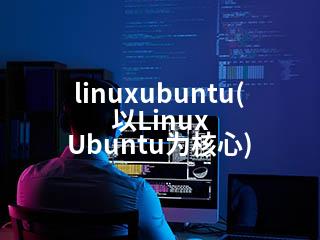linuxubuntu(以Linux Ubuntu为核心)
Linux Ubuntu: An Overview
Linux Ubuntu, based on the Linux kernel, is a popular open-source operating system known for its stability, security, and user-friendly interface. In this article, we will explore the various aspects of Linux Ubuntu, including its history, features, user interface, software ecosystem, security, and community support.
History of Linux Ubuntu
Linux Ubuntu was first released in 2004 by Canonical Ltd. It is based on Debian, another popular Linux distribution, and is named after the Southern African philosophy of Ubuntu, which means "humanity towards others." Since its inception, Ubuntu has gained a large and dedicated user base, and it has become one of the most widely used Linux distributions in the world.
The release cycle of Ubuntu is predictable, with a new version being released every six months. This ensures that users have access to the latest features and improvements on a regular basis. Additionally, Ubuntu LTS (Long Term Support) releases are made every two years, providing extended support and stability for enterprise users.
The Ubuntu community is also a key aspect of its history, with a strong emphasis on collaboration and open-source development. The community actively contributes to the development and improvement of Ubuntu through testing, bug reporting, and the creation of software packages.
Features of Linux Ubuntu
Linux Ubuntu comes with a wide range of features that make it a versatile and powerful operating system. It has a customizable user interface, with support for various desktop environments such as GNOME, KDE, and Xfce. This allows users to tailor their Ubuntu experience to their specific needs and preferences.
Ubuntu also includes a comprehensive set of pre-installed software, including a web browser, office suite, media player, and a variety of productivity tools. The Software Center provides access to thousands of additional applications, making it easy for users to find and install the software they need.
One of the key features of Ubuntu is its focus on security. The operating system includes built-in firewall and encryption tools, as well as regular security updates to protect against vulnerabilities and threats. Additionally, Ubuntu benefits from the security advantages of open-source software, as its code is constantly reviewed and improved by a global community of developers.
User Interface of Linux Ubuntu
The user interface of Ubuntu is designed to be intuitive and easy to use, making it accessible to both beginners and experienced users. The Unity desktop environment, which was the default in earlier versions, provided a clean and modern interface with a sidebar for quick access to applications and settings.
In recent versions, Ubuntu has transitioned to using the GNOME desktop environment by default. This change has brought a more traditional desktop experience to Ubuntu, with a focus on simplicity and efficiency. Users can customize the GNOME interface to suit their preferences, with options for themes, extensions, and layout adjustments.
The Ubuntu Software Center, now known as the GNOME Software tool, provides a centralized location for discovering and installing applications. This makes it easy for users to find new software and manage their existing installations, all within a unified and user-friendly interface.
Software Ecosystem of Linux Ubuntu
Ubuntu benefits from a rich and diverse software ecosystem, with a wide range of applications and tools available for users to explore. The Ubuntu Software Center, as well as third-party repositories, offer access to thousands of open-source and proprietary software packages.
Ubuntu is also compatible with a variety of development tools and programming languages, making it a popular choice for software developers and IT professionals. The operating system supports containerization and virtualization technologies, such as Docker and KVM, allowing for efficient and scalable application deployment.
In addition to desktop software, Ubuntu is widely used in server environments, powering a significant portion of the internet's infrastructure. Its reliability, performance, and support for cloud computing make it a popular choice for web hosting, data centers, and enterprise IT operations.
Security of Linux Ubuntu
Security is a top priority for Ubuntu, with regular updates and patches to address potential vulnerabilities and threats. The operating system benefits from the security advantages of open-source software, as its code is constantly reviewed and improved by a global community of developers.
Ubuntu includes a built-in firewall, as well as encryption tools to protect sensitive data. The operating system also benefits from the security features of the Linux kernel, such as mandatory access controls and secure computing modes. Additionally, Ubuntu provides tools for managing user permissions and access control, helping to prevent unauthorized access to system resources.
The Ubuntu community plays a key role in maintaining the security of the operating system, with active participation in bug reporting, vulnerability testing, and the development of security-focused software. This collaborative approach helps to ensure that Ubuntu remains a secure and reliable platform for users and organizations.
Community Support for Linux Ubuntu
The Ubuntu community is a vibrant and inclusive ecosystem, with a strong emphasis on collaboration, support, and open-source development. Users can access a wealth of resources, including forums, documentation, and online communities, to seek help, share knowledge, and contribute to the improvement of Ubuntu.
Canonical Ltd., the company behind Ubuntu, provides commercial support and services for enterprise users, including long-term support and security updates. This ensures that businesses and organizations have access to the expertise and assistance they need to deploy and maintain Ubuntu in their environments.
The Ubuntu community also fosters a spirit of innovation and creativity, with active participation in software development, testing, and bug reporting. This collaborative approach has led to the creation of a diverse and thriving ecosystem of applications, tools, and resources, all of which contribute to the ongoing success of Ubuntu as a leading open-source operating system.
Conclusion
In conclusion, Linux Ubuntu is a powerful and versatile operating system with a rich history, a wide range of features, a user-friendly interface, a diverse software ecosystem, strong security measures, and a vibrant community. Its commitment to open-source development, collaboration, and user empowerment has made it a popular choice for individuals, businesses, and organizations around the world. Whether you are a beginner or an experienced user, Ubuntu offers a reliable and flexible platform for your computing needs.
(牛站网络)







